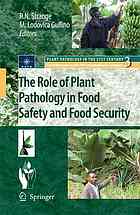

Most ebook files are in PDF format, so you can easily read them using various software such as Foxit Reader or directly on the Google Chrome browser.
Some ebook files are released by publishers in other formats such as .awz, .mobi, .epub, .fb2, etc. You may need to install specific software to read these formats on mobile/PC, such as Calibre.
Please read the tutorial at this link: https://ebookbell.com/faq
We offer FREE conversion to the popular formats you request; however, this may take some time. Therefore, right after payment, please email us, and we will try to provide the service as quickly as possible.
For some exceptional file formats or broken links (if any), please refrain from opening any disputes. Instead, email us first, and we will try to assist within a maximum of 6 hours.
EbookBell Team

4.0
6 reviewsThis book views the vulnerability of our crops in general to devastating diseases as well as specifically the disease problems of two important staples, rice and cassava. Increased travel and increased transport of plant material throughout the world pose ever more significant risks to the health of our plants. These include not only the destruction of our food crops by pathogens which may be imported accidentally or maliciously but also their contamination by fungi that produce powerful toxins (mycotoxins). How we should respond to these challenges is the subject of several papers. Clearly, quarantine is an important measure by which the spread of plant pathogens may be at least delayed, if not curtailed altogether, but breeding plants for resistance is the mainstay for maintaining the comparative health and productivity of our crops. However, adequate resistance may not be available in the gene pool of a given species or genus and therefore the possibility of genetic modification arises, a topic treated in two of the papers.